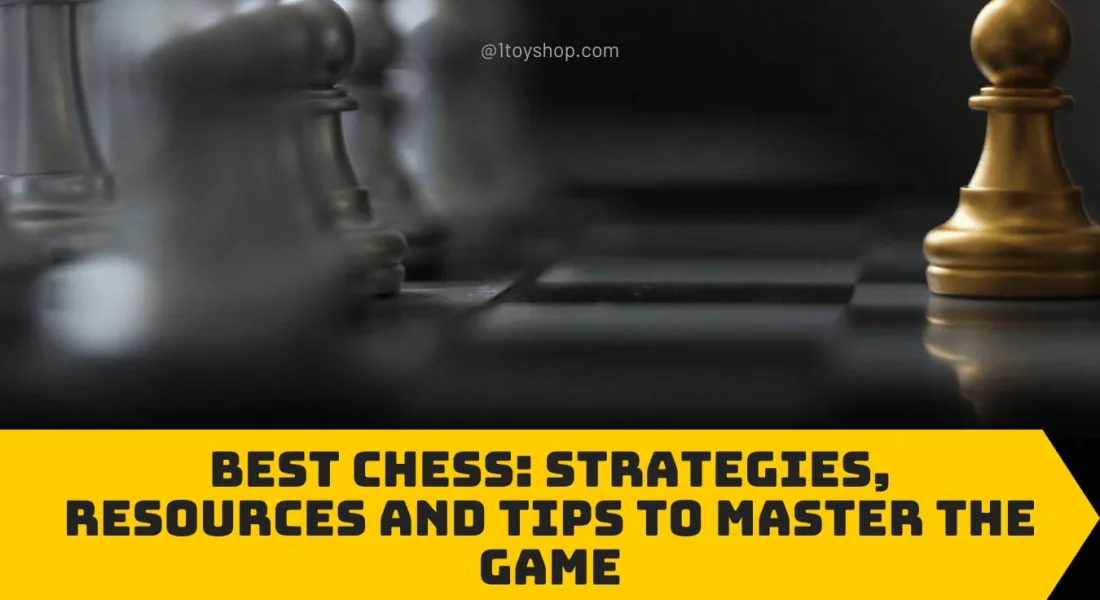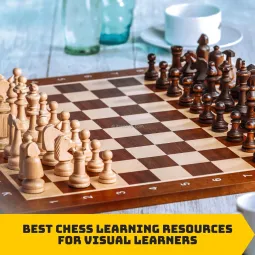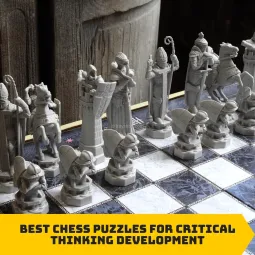
To Get More Wonderful Toys And Take Discount Today. Click On The Image.
Chess, the ancient game of kings and queens, continues to captivate minds and hearts around the world. Whether you're a beginner or an experienced player, there's always room for improvement and growth in this fascinating game. In this blog post, we'll explore some of the best chess strategies, resources, and tips to help you elevate your game and experience the joy of mastering this timeless pursuit.
The Fundamentals of Chess Success
Understanding the Basics
Before diving into advanced strategies, it's crucial to have a solid grasp of the fundamentals. Chess is a game of patience, planning, and precision. Each piece on the board has its unique moves and value, and understanding how to use them effectively is the first step towards improvement.
Know your pieces: Learn the movements and relative values of each piece
Master the rules: Familiarize yourself with special moves like castling and en passant
Practice basic checkmates: King and Queen vs. King, King and Rook vs. King
Developing a Strong Opening Game
The opening phase of a chess game sets the tone for the entire match. A well-executed opening can give you a significant advantage, while a poor one can leave you struggling to recover.
Study classic openings: Familiarize yourself with popular openings like the Sicilian Defense or the Queen's Gambit
Focus on controlling the center: The central squares of the board are crucial for piece development and control
Develop your pieces efficiently: Aim to get your pieces into active positions early in the game
"The goal of the opening is to develop pieces to good squares where they will have maximum impact on the game." - Garry Kasparov
Advanced Chess Strategies
Mastering the Middlegame
The middlegame is where the real battle begins. This phase requires careful planning, tactical awareness, and strategic thinking.
Create and exploit weaknesses: Look for opportunities to create pawn weaknesses in your opponent's position
Improve piece placement: Continuously seek better squares for your pieces
Develop a keen sense of initiative: Maintain pressure on your opponent by creating threats and limiting their options
Endgame Excellence
Many chess games are won or lost in the endgame. Developing strong endgame skills can turn draws into wins and save seemingly lost positions.
Study fundamental endgame positions: King and pawn endings, rook endings, and minor piece endgames are essential
Practice endgame techniques: Learn key concepts like opposition, zugzwang, and pawn breakthroughs
Develop patience and precision: Endgames often require careful maneuvering and exact calculation
Essential Resources for Chess Improvement
Online Platforms and Tools
The digital age has brought a wealth of resources to chess players of all levels.
Chess.com and Lichess: These popular platforms offer free play, puzzles, and learning resources
Chess engines: Engines like Stockfish can help analyze your games and identify improvements
Online courses: Websites like Chessable offer structured learning paths for various aspects of chess
Books and Literature
Despite the digital revolution, chess books remain an invaluable resource for serious improvement.
"My System" by Aron Nimzowitsch: A classic text on positional play
"Zurich International Chess Tournament, 1953" by David Bronstein: An excellent source for middlegame strategy
"Silman's Complete Endgame Course" by Jeremy Silman: A comprehensive guide to endgame play
Chess Coaches and Mentors
Working with a experienced coach can dramatically accelerate your chess progress.
Seek out local chess clubs: Many clubs have experienced players willing to share their knowledge
Online coaching: Platforms like Chess.com offer coaching services from titled players
Analyze games with stronger players: Learning from your mistakes is crucial for improvement
Tips for Effective Chess Practice
Solving Puzzles
Tactical puzzles are an excellent way to sharpen your calculation skills and pattern recognition.
Solve puzzles daily: Even just 15-30 minutes a day can lead to significant improvement
Focus on quality over quantity: Take time to understand each puzzle thoroughly
Vary the difficulty: Challenge yourself with harder puzzles as you improve
Analyzing Your Games
Self-analysis is a crucial skill for any serious chess player.
Review every game: Win or lose, there's always something to learn from each game
Use chess engines judiciously: While engines are helpful, try to analyze on your own first
Focus on critical moments: Pay special attention to turning points in the game
Playing Regular Games
There's no substitute for actual game experience in chess improvement.
Play against various opponents: Each player has a unique style, and adapting to different approaches is valuable
Participate in tournaments: Competitive play can help you gauge your progress and identify areas for improvement
Don't fear losing: Every loss is an opportunity to learn and grow
Conclusion
Chess is a journey of continuous learning and improvement. By focusing on fundamental strategies, utilizing available resources, and maintaining a consistent practice routine, you can steadily enhance your chess skills. Remember, the joy of chess lies not just in winning, but in the process of growth and discovery. Whether you aspire to become a grandmaster or simply want to enjoy friendly games with increased competence, the world of chess offers endless opportunities for enrichment and enjoyment.
So, set up your board, arrange your pieces, and embark on your chess adventure. With patience, persistence, and passion, you'll find yourself making impressive moves and experiencing the thrill of outwitting your opponents. Happy playing, and may your chess journey be filled with exciting games and satisfying victories!
Source: Team 1ToyShop (1.T.S) compiled, analyzed and wrote.

Best Chess Endgame Techniques For Pawn Structures
Author name
24.07.2024

Best Chess Learning Resources For Visual Learners
Author name
24.07.2024

Best Chess Opening Variations For Black Pieces
Author name
24.07.2024

Best Chess Puzzles For Critical Thinking Development
Author name
23.07.2024
